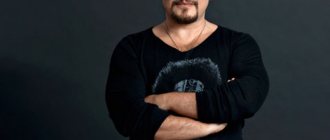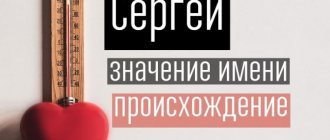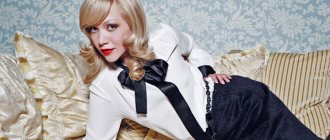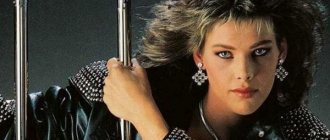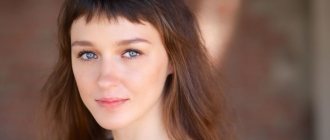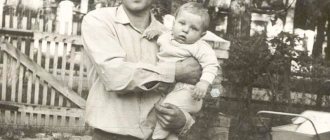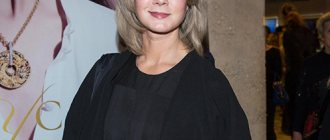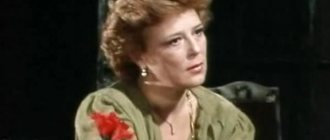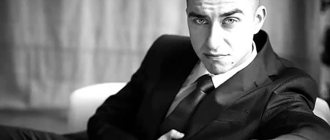Biography
Family
She was born in Moscow on November 28, 1990. Her mother has Polish and German roots (hence the unusual surname), she comes from the city of Petropavlovsk-Kamchatsky. The singer's father is of Ukrainian and Gypsy origin. Julia has an older sister, her name is Diana.
As a child, she lived with her parents for five years in Odessa, then their family moved again to Moscow. After her parents’ divorce, the future artist took her mother’s last name – Siewert.
In 2004, the singer’s mother was able to start her own business by opening a clothing store.
In her early years, Yulia was actively involved in dancing and went to a ballet studio, and the place of her favorite school subject was firmly occupied by the English language. Since her grandmother knew how to sew well, already as a child she was able to try on a wide variety of images in which she performed in front of guests, for which she received the nickname “artist.” Also, thanks to her grandmother, Julia fell in love with poetry and music.
Life after school, work as a flight attendant
After graduating from school, the girl studied to become a clothing designer, worked as a florist, but soon decided to become a flight attendant.
Siewert's dream of flying appeared in her childhood, when her parents took her with them on long and long-distance business trips, which were an integral part of their job responsibilities. In addition, financial problems that arose in the family inevitably forced the girl to think about finding a permanent job and to suspend her studies.
Having tried her hand at design, she makes the final choice in favor of aviation - monotonous office work is abhorrent to her nature. As a result, Yulia has been working for several years (in the early 2010s) in the prestigious fourth department of Aeroflot, where she ended up thanks to her impressive appearance and good command of English.
Constant flights did not frighten her at all; on the contrary, such activities, filled with travel and new impressions, fully corresponded to her impetuous nature and sociable character.
But over time, she also became bored with aviation, perhaps this was facilitated by the strict dress code requirements, mandatory for all Aeroflot employees and never fully accepted by Yulia. In addition, by her own admission, she began to get tired of the image of a helpful flight attendant.
After leaving Aeroflot, Sievert danced for some time, devoting herself to another of her favorite activities, but soon their dance group broke up. After these events, Julia began to seriously think about starting a professional music career.
Daughter of Vladimir Turchinsky - Ksenia Turchinskaya
At the end of the 90s of the last century, our today's hero became a dad for the second time. The third wife gave him a daughter, whom the family council decided to name Ksenia.
The baby was an active and creative person. She studied dancing and music from a young age. Her dad was always proud of his daughter’s successes. He spent a lot of time with the girl. And for her, the sudden passing of her beloved daddy was a blow.
The daughter of Vladimir Turchinsky, Ksenia Turchinskaya, studies at one of the capital’s universities. She decided to connect her future with choreography.
Career
The beginning of a singer's career
Her vocal debut came in 2020, when the aspiring performer took part in a competition for young artists, winning her first music award there.
The successful debut inspired Sievert to further pursue music and improve her vocal abilities. She began to regularly practice vocals in a specialized professional studio, along the way acquiring a number of important contacts in terms of creative development and growth.
The girl still feels a great sense of gratitude and sympathy for the teachers who worked with her at that time. Later she was able to assemble her own musical team.
The arrival of popularity
Julia's fame was brought by the video clip “Chuck”, which appeared on the Internet in April 2020, filmed for the composition of the same name. Everyone was able to participate in its creation, whom the singer invited to participate in the filming through social networks. This video, ironic in essence, and budget-friendly for the money invested in it, shot from a quadcopter and a camera mounted on a car, quickly collected more than half a million views.
In the fall of 2020, another popular video of the singer followed, “Anesthesia,” which consolidated her initial success and was filmed by director Maria Skobeleva, known for her previous works with American hip-hop artists.
At the same time, Yulia enters into a contract with the First Music Publishing House label, which collaborates with Dima Bilan, Ivan Dorn, Rita Dakota, Nyusha and other famous performers. Concluding an agreement with a well-known and influential label allowed the singer to join a professional team that facilitates the full development of her creative potential.
Soundtrack for a TV project
In December 2020, the singer became a guest of the program “Party Zone Muz-TV”, and just before the New Year she visited A. Malakhov’s program “Live Broadcast”, where she sang in a duet with Karina Khvoinitskaya the composition “Wind of Change”, which was first heard in the film about Mary Poppins.
Subsequently, this song was included in the soundtrack to the television series “Chernobyl 2. Exclusion Zone,” which started on the same days.
Release of debut album and first tour
At the beginning of 2020, the singer released her debut album, called “Shine.” According to her own plan, the released record should evoke positive and sublime emotions in the listener. All the songs on the album are in a similar style, defined by Yulia as “Vintage pop”. But the presence of a common style and a unified concept does not negate the originality of each specific composition on the record, their imagery, individuality and unique mood.
The autumn months of 2020 were marked by her first tour for the singer, and the debut tour was immediately followed by the next one, during which the artist visited not only Russian, but also several Belarusian cities.
Performer's career today
The beginning of 2020 will be remembered for the singer’s unique career record - her song “Life” was ranked eighth on Apple Music in terms of the number of streams and became the fifth most purchased on iTunes.
The new tour that took place this year significantly expanded the list of places she visited: many Russian cities were added to them, as well as Odessa and Chisinau, then the performer visited Kazakhstan for the first time.
In January 2020, fans were able to listen to Yulia’s live broadcast on Avtoradio, and a month later she gave an impromptu concert in the capital’s metro.
https://www.youtube.com/watch?v=EHXkV2S5Hq8
In those same days, Siewert took part in the major festival “Big Love Show”, held by “Love Radio” for the first time in her career, calling her participation in this event an important and unexpected event for her. In the spring, she received the first big award in her career, becoming the winner of the BraVo award for the main breakthrough of last year.
Dreams and creative plans
The singer’s immediate plans include performing a song together with a celebrity, while the name of the other half of the duet has not yet been revealed to the public. She also wants to learn to play the synthesizer, sing a jazz-style composition and record a solo album with lyrics in English. At the same time, work is underway on the performer’s next Russian-language album.
The most famous videos and compositions
"Chuck"
A debut low-budget and in its own way unusual video, created not at all according to the canon of the music video genre. All the characters in the video were played by people who did not know each other, whom the singer invited to participate in the work on the video, having announced its filming on her Instagram page the day before.
"Anesthesia"
The plot of the video was written by its creators under the influence of the X-Men comics. Siewert appeared in the video in a kind of futuristic image, designed to reveal the sensual side of her character.
"Life"
The filming of the video for the song “Life” took place in Hong Kong, although it was originally planned to be filmed in New York, but Yulia was unable to promptly obtain an American visa. Over two days of filming, the group managed to work in a dozen different city locations, although none of the participants in the process had ever been to Hong Kong before. In many ways, this fruitful work was facilitated by a specially hired guide, a local resident who spoke Russian, although much was done impromptu.
As a result, we managed to get a very dynamic, atmospheric video, imbued with the spirit and life of the big city, reflecting its non-stop, seething life, which is what the creators of the video required.
The Asian flavor added originality to the video, and, according to the singer, she was completely satisfied with the final result of the work. She stopped regretting that the video was not filmed in New York, because over the past few decades this city has become quite familiar in various music videos.
Yulia called Hong Kong a strange city, but it fully corresponded to her inner feelings and the message that the creators tried to convey to viewers through the video, in particular, the so-called positive loneliness, often felt by residents of megacities.
Personal life
Hides his personal life
Little is known about the singer’s personal life. Yulia is not married and has no children. Around 2020, she began dating a certain Evgeniy, who worked as a DJ. On social networks, the artist often shared their photos, which told about the couple’s joint travels, mainly to Asian countries. Her mother fully approved of her daughter’s choice, considering the young people an almost ideal couple.
But a year ago, the performer stopped posting joint photos with her lover, although there were no hints of a break in the relationship either. For this reason, many fans of the singer believed that Siewert simply wants to hide her personal life from the views of strangers, protecting herself and her loved ones from the unnecessary and not always pleasant close attention of others. But the relationship within the couple, in their opinion, has still been preserved, it’s just that now they are carefully hidden due to the rapidly increasing popularity of the artist.
Also, Yulia has more than once admitted her affection for her family members: her mother, older sister and grandfather, she calls them her main critics and the most important friends in life. Her mother was and remains her main fan and adviser, and the singer considers her grandfather to be an excellent conversationalist and simply a wise man.
BIOGRAPHY
BIOGRAPHY (from bio... and...graphy), biography; human life, studied and described in scientific, fiction and reference literature.
Personal history, the life path of a person can be considered either from his own point of view, or from the point of view of an outside observer, a researcher of the life of a particular person in his connection with society, culture, history. In the first case, an individual’s ideas about his life path are formed gradually; moreover, they can change in relation to individual events and the overall assessment. A person constantly defines his identity in the unity of personal uniqueness and belonging to the world around him. In the second case, individual bios and whole groups selected in a certain way are the subject of scientific research. research and philosophy, cultural studies and religious reflections. In the 20th century several specials were formed. scientific disciplines studying various aspects of human B. These include: psychobiography, exploring psychological. personality traits and motives of actions; biography, developing theoretical, methodological, historiographical, source studies. B.'s problems; prosopography, which deals with social history, the creation of “collective biographies” of certain groups of people who acted or are acting in history.
Subject B. as lit. genre - individual life historical. persons (politician, commander, writer, scientist, etc.) in the socio-cultural context of his time. B. considers the history of the individual in internal (intellectual, mental, etc.) development and external forms of behavior and activity, and individual life as an event of objective interest and significance. B. can be scientific, artistic, popular, etc. As a European genre. B.'s literature was formed during antiquity ["Comparative Lives" of Plutarch (1st century), "Biography of Agricola" by Tacitus (97), "Life of the Twelve Caesars" by Suetonius Tranquilla (119–121)]. In the Middle Ages, Bulgaria was represented primarily. hagiography, in the Renaissance - the works of G. Vasari, P. Brantome and others. Examples of the genre were “The History of Charles XII” by Voltaire (1731), “The Life of S. Johnson” by J. Boswell (1791), “Fon-Visin” by P. A. Vyazemsky (1830, published 1848), “A. S. Pushkin in the Alexander era” by P. V. Annenkov (1874). In the 20th century Artists are becoming widespread. B., among which are works by S. Zweig, A. Maurois, R. Rolland. In Russia, in the genre of art. B. written by V. F. Khodasevich “Derzhavin” (1931), “Dmitry Merezhkovsky” by Z. N. Gippius (1945, published 1951), and others. Since 1933, biographical works have been published. series “The Life of Remarkable People” (founded in 1890 by F. F. Pavlenkov, recreated by M. Gorky). Among literary scholars. B. highlights the studies of Yu. M. Lotman (“A. S. Pushkin. Biography of the Writer,” 1981), M. O. Chudakova (“Biography of Mikhail Bulgakov,” 1988).
A special type of B. - reference article in biography. dictionary Its origins lie in the dictionaries of church writers [“The Book of Famous Men” (“De viris illustribus”, 4th century) by Jerome the Blessed, etc.]. The first biographical The dictionary appeared in Russia in the 18th century. – “The Experience of a Historical Dictionary about Russian Writers” by N. I. Novikov (1772). In the 19th century Multi-volume biographical works are published. dictionaries: “History of the Russian hierarchy” by Hieromonk Ambrose (Ornatsky), “Dictionary of memorable people of the Russian land” by D. N. Bantysh-Kamensky (vol. 1–8, 1836–1847), “Critical-biographical dictionary of Russian writers and scientists. From the beginning of Russian education to the present day,” ed. S. A. Vengerova (vol. 1–6, 1886–1904, not completed), “Russian Biographical Dictionary” Rus. historical society (vol. 1–25, 1896–1913), etc.
Since the 19th century in society there is an awareness of the importance of B. not only of outstanding people, but also of others. the “simple” person as a record of human history and a source for scientific (historical, cultural, psychological, sociological) research. This was expressed in numerous numbers. biographical publications dictionaries, in creating repositories of family and personal biographies and documents. For example, in Salt Lake City (USA) in the 1830s. a publicly accessible Family History Library was organized (now the Genealogical Library), in which over a century and a half (by the end of the 1990s) there were 270 thousand volumes and 2 million microfilms of biographical history. character. In Russia in the 19th century. Many biographical works have appeared. dictionaries built by type of activity (about the military, musicians, professors and university graduates, doctors, etc.), in the department. provinces and districts. In the 1980s–90s. collections of biographies and autobiographies, personal documents were created under the auspices of the Memorial Society, the Moscow Historical and Archival Institute, Sociological. Institute of the Russian Academy of Sciences (St. Petersburg) and other organizations, other biographical databases are appearing. data.
In the 20th century biographical reference continuing publications such as “Who is who?” have become widespread. by department countries, regions and international, etc. As a rule, they are compiled according to prof. principle; characters are selected according to status and career criteria: ratings for politicians, academic degrees and number of publications for scientists, financial status, position in the management hierarchy for businessmen, etc.
See also Autobiography, Lives of Saints, Memoirs.
Other facts
Favorite music
Her favorite artists are Madonna, Whitney Houston, Michael Jackson and Chak Khan. She admits that she listens to music of different genres, giving preference to musicians who inspire her own creative search.
There were no professional musicians in Yulia’s family, but her father and mother had good musical taste and music was played almost constantly in their house. Siewert admits that she grew up listening to the music her parents loved.
Opinion about fans
He calls his fans well-mannered and adequate people, explaining this by the fact that he makes music similar to popular American songs of the late twentieth century, which is listened mainly by an adult audience. The singer hopes that in the future she will be able to maintain and increase just such an adequate, emotionally restrained and polite audience.
Alternative activity
In one of the interviews, Julia admitted that she would have taken up design if she had not received recognition in the musical field. All this sounds quite plausible: she really has a design education, the artist even managed to work in her profession for some time.
The appearance of a stage name
At birth, Yulia received her father’s surname - Sytnik, but the surname Sievert cannot be called a pseudonym in the full sense of the word. This is her mother’s maiden name, which the future artist took after her parents’ divorce, and it is also written in her passport. This is how the singer Zivert appeared.
Tattoo
After leaving her job as a flight attendant, Yulia received freedom of expression not bound by a strict dress code, which she took advantage of by getting several tattoos. Currently, the singer has three tattoos.
The first design is a seascape and is applied to the upper back, the second tattoo is the word “thank you” located on the singer’s wrist, the third is a few stars on her neck.
Rejection of bad habits
In her youth, Sievert smoked and never denied herself a glass of wine, but recently she decided to completely eliminate any bad habits from her life, which she told fans about on her page.
The artist justified her choice in favor of an absolutely sober lifestyle with a responsible attitude towards her own health and concern for the health of her future children.
Love for vintage
Julia is crazy about vintage things, especially clothes and hairstyles from the last quarter of the twentieth century. She is firmly convinced that in terms of avant-garde fashion of that time, it surpasses all modern trends. The singer had long dreamed of appearing in the image of a pop diva of those years, with a characteristic hairstyle and makeup, in one of her videos, which she took advantage of when creating the video for the song “Green Waves.”
Fear of criticism
She is very afraid of criticism, this fear manifested itself especially clearly at the very beginning of her singing career, when the aspiring performer could not accept the very fact of the jury’s assessment of her vocal abilities, indicating the mistakes made.
Such rejection prevented her from participating in auditions - Sievert was seriously afraid that harsh criticism could negatively affect her perception of herself as a vocalist and lower her self-esteem.
Quick Facts
- 22. She did not receive a specialized musical education, but met her vocal teacher, I. Molchanova, on one of the social networks. He considers the most important aspect in teaching vocal skills to be the preservation of the individuality of the performer.
- 23. She has repeatedly admitted that she always listens to the opinion of her producer, and he provides her with the necessary creative freedom. Believes that producers have all the leverage necessary to bring songs to mass audiences.
- 24. She is regularly active on social networks, with more than 630,000 users following her on Instagram.
- 25. In his free time, he enjoys sewing and yoga, walks with his dog Businka, and loves to sleep and meditate.
- 26. Believes in the materiality of thoughts.
- 27. He prefers Italian cuisine, his favorite dish is pizza.
- 28. In the future, she dreams of having her own family, with whom she intends to live in a country house.
- 29. She doesn’t think that her sudden popularity has changed her and hopes that this will never happen. He admits that he lives in the same apartment as before and drives a car made in 2006.
50 facts about Keira Knightley
26 facts about Cameron Diaz
19 facts about Shakira
18 facts about Matthew McConaughey
48 facts about Angelina Jolie
17 facts about Ronaldinho
Biography and personal life of Vladimir Turchinsky
The biography and personal life of Vladimir Turchinsky are interesting and original. Without this data, it is impossible to fully imagine how this strong and courageous man lived and worked.
Volodya was born in Ulyanovsk. He lived there for 6 years. Then his parents divorced. The father left the family. The boy hardly saw him. The mother did everything for the happiness of her only son. She soon married a second time. It was his stepfather who had a significant influence on Volodya’s development.
From the age of 5, the boy went in for sports. I began to dream of becoming an athlete at the age of 10. A year later, he received awards at various events. As a teenager, he became a member of the capital's sambo team. It was in this sport that the guy became a master.
In high school, Turchinsky began to dream of a career as a programmer. Having received a school certificate, yesterday's graduate became a student at one of the capital's institutes. After studying at the university for three years, the young man realized that the profession of a programmer did not suit him either. He goes to the military registration and enlistment office and literally asks to join the armed forces. Soon Vladimir serves in one of the units near Moscow, where he studies the profession of a military communications operator.
Having been demobilized, our hero decided not to re-enter his institute. He enters another university in the capital, where he studies the basics of teaching physical education.
During the difficult years of perestroika, Turchinsky tried a large number of professions. He was engaged in photography and translations, guarded various artistic personalities, worked at a meat processing plant, and taught children in primary school. In the late 80s, the young man began to play sports professionally. He was interested in sambo, judo, freestyle and classical wrestling, and American football.
In the early 90s, Vladimir was invited to shoot a video clip for one of Vetlitskaya’s songs. Then the man began to take part in various show programs. Spectators watched him with interest in Gladiator Fights. Turchinsky hosted “Fear Factor”, “Slaughter League” and a number of other programs. The celebrity also worked on the radio, where he talked about the history of jazz and blues melodies.
The man played in a large number of films, where he invariably acted as strong and courageous heroes.
In 2006, our hero wrote a book that immediately became a bestseller. In it he told how to live healthy and successful. The artist was also involved in political activities. In 2009, unexpectedly for many, the star passed away.
Three times Vladimir tried to improve his personal life. Only on the third try did he become happy.

